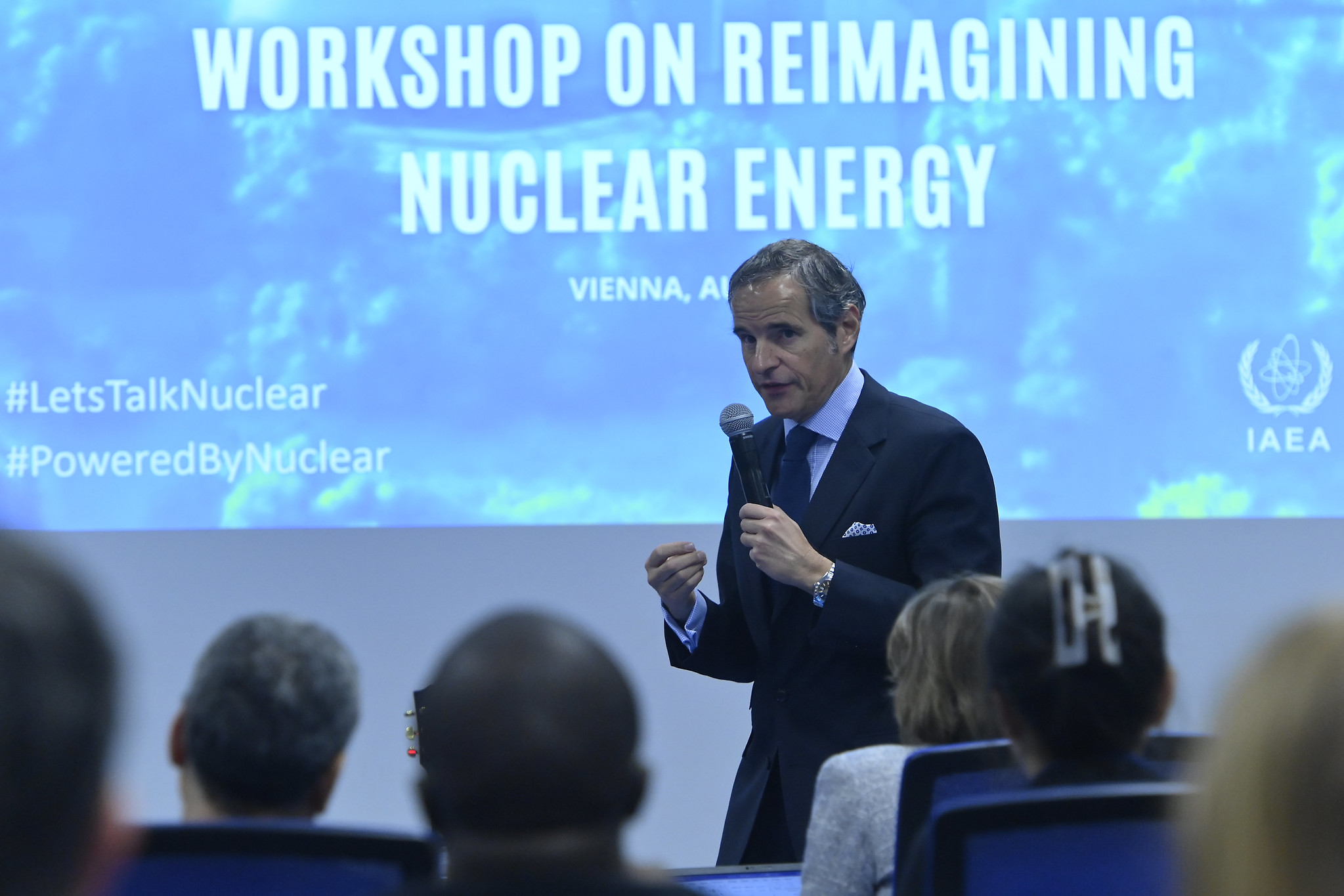Stakeholder and communications experts met representatives from academia, government and industry at the IAEA to explore creative and innovative ways to engage stakeholders and “reimagine” nuclear energy, which provides a quarter of all low-carbon electricity yet still struggles for public acceptance.
Nuclear Energy ‘Reimagined’ at IAEA Workshop on Stakeholder Engagement
An image by David Marcheskie of the United States from the 2022 Nuclear Power Art Contest
Over 60 participants from 32 countries and five international organizations came together for the three-day Workshop on Reimagining Nuclear Energy, held at the Agency’s Vienna headquarters on 26-28 April. The workshop built on an event held last year at the International Ministerial Conference on Nuclear Power in the 21st Century, which also featured works from a nuclear energy art contest organized by Generation Atomic in collaboration with the IAEA.
In his concluding remarks, IAEA Director General Rafael Mariano Grossi told participants to be bold in their communications and outreach about nuclear energy’s role in addressing climate change. “There is no need to start our conversations being shy,” Mr Grossi said. “What we are doing is part of the solution to a global existential problem. And I think this affirmation is very important—because it’s true.”
Interest in embarking on or expanding nuclear power is growing worldwide as public opinion increasingly recognizes its role in reducing emissions for a net-zero world while ensuring supply of energy. Thirty-two countries use nuclear power, and some 30 others are interested in, or embarking on, its introduction, with new reactors under construction in Bangladesh, Egypt and Turkey. In the high case scenario of its latest projections on nuclear energy, the IAEA sees capacity more than doubling to 873 gigawatts net electrical (GW(e)) by 2050, compared with current levels of around 368 GW(e).
Still, public acceptance is continuing to be a key barrier to nuclear energy deployment in many countries. Explaining nuclear energy, strengthening relationships, and building trust with stakeholders remains key to the successful implementation, operation, and expansion of all nuclear facilities, including nuclear power plants. “To gain community support and public acceptance of nuclear energy, we need to understand opinions and concerns, then respond appropriately,” said Sharon Kanana, a nuclear medicine technologist at Kenyatta University Hospital in Nairobi and is Vice President of the Kenyan Young Generation in Nuclear.
Highly interactive, the workshop featured a diverse range of presentations, music, videos, panel talks and hands-on exercises. The event was part of a new drive by the IAEA to meet the growing needs of countries in this area in developing programmes for engaging stakeholders and communicating about the benefits and risks of nuclear technologies.
“I seldom attend an event with so much diversity in the room, not only in populations but in terms of representing a diversity of thought,” said Zion Lights, a science communicator from the United Kingdom. “We all learned something new. We were all challenged by some of the things we heard. And based on what I’ve heard from others at this workshop and from feedback from my talk, we all want to build on the ideas that we’ve developed here.”
Participants showcased their efforts and strategies on public outreach for nuclear energy, exchanging experiences and lessons learned from engaging and communicating with various stakeholders. Topics included public opinion research on nuclear energy; opera singing with pro-nuclear lyrics in the United States; art works portraying a new, positive and futuristic vision of nuclear energy; the importance of public information centres at nuclear power plants; the need for personally engaging with local communities, addressing their needs and concerns; and working with young schoolchildren who have not had any previous education in nuclear science.

IAEA Director General Rafael Mariano Grossi delivers his closing remarks at the last day of the Workshop on Reimagining Nuclear Energy organized by the Department of Nuclear Energy held at the Agency headquarters in Vienna, Austria. 28 April 2023 (Photo Credit: Dean Calma / IAEA)
Lujain Khalaileh, a former schoolteacher who is now a nuclear engineer with the Jordan Atomic Energy Commission, described how she once handled misinformation about nuclear energy among her students by organizing in-class debates on the differences between nuclear energy used for military purposes versus its peaceful applications in energy production, medicine, industry, and agriculture.
“The term nuclear was reimagined positively by my students,” she said. “And now we are working as a team at the Jordan Atomic Energy Commission to create a new image of nuclear energy in different areas of Jordan by conducting many activities with our stakeholders. My participation at this workshop has definitely added value for the stakeholder involvement strategy of Jordan’s nuclear energy programme. Sharing ideas with all outstanding participants from over 30 countries has been a great experience.”
As the IAEA gears up for its first-ever international conference on stakeholder engagement, set for 2025, the Agency is developing new services to meet national needs, including an advisory service as well as a school on stakeholder engagement. Input from the workshop will be distilled into a report featuring highlights, main messages and good practices.
“This event brought together those who have built national nuclear programs, who are about to build programs, those who have promoted nuclear around the world, and some who have only recently discovered the promise of nuclear,” said Mark Nelson, a Chicago-based nuclear engineer and Founder and Managing Director at Radiant Energy Group. “The workshop itself achieved what it sought in its title: a reimagining of nuclear energy for our times."




